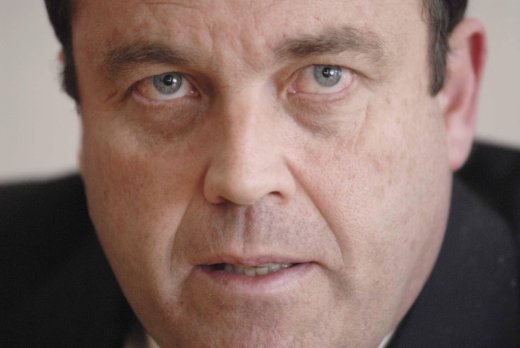50 billion euros is an awful lot of money for the Republic of Ireland.
Finance Minister Brian Lenihans is bankrupting Ireland, looting the people and is financing the elite banksters of the world that are 50 billion euros richer.
Never was robbing a bank more easy, risk-free and lucrative.
The media is always telling the people about the losses and never about the elite criminals who made a fortune and are on the other side of those intentionally bad investments.
See also:
– Nationalised Anglo Irish Bank Posts €8.2 Billion Losses For Half Of 2010!
– Anglo Irish Bank losses are the worst in the entire world
– Ireland: Central Bank Hid Property Crash Forecast

“The Irish banking system is at rock bottom today,” Lenihan said today.
(30 Sept.) Bloomberg — Ireland is preparing to take majority control of Allied Irish Banks Plc and pump extra cash into Anglo Irish Bank Corp., raising the cost of repairing the financial system to as much as 50 billion euros ($68 billion).
“The Irish banking system is at rock bottom today,” Finance Minister Brian Lenihan said today in a Bloomberg Television interview in Dublin. He rejected speculation Ireland will need outside help. “It can only revive from now because it’s recapitalized and reformed,” he said.
Ireland’s deteriorating finances fueled investor concerns that it would become the first government after Greece to tap the 750 billion-euro rescue fund set up by the European Union and International Monetary fund to stanch the debt crisis. Irish bonds have plunged this month, sending the yield on 10-year securities to higher than any other euro nation except Greece.
The cost of bailing out the country’s banks may ultimately rise to about 50 billion euros, under a “stress case” scenario for Anglo Irish, according to figures published by the country’s finance ministry and the central bank in Dublin today. The base case estimate is about 45 billion euros, the figures show. Allied Irish may need as much as 3 billion euros.
Among the biggest Irish lenders, only Bank of Ireland Plc and Irish Life & Permanent Plc will remain outside state control after the bailouts.
‘Believable Guidance’
“Investors have been looking for clarity and believable guidance on how bad things are,” said Padhraic Garvey, head of developed-market debt strategy at ING Groep NV in Amsterdam. “This morning should go some way to satisfying such calls.”
Ireland has pumped 22.9 billion euros into Anglo Irish since it seized the lender in January 2009 as its bad loans soared following the collapse of a decade-long real-estate bubble. The rising cost of the bank bailouts prompted Standard & Poor’s to downgrade Ireland’s credit rating last month.
The yield spread between Irish and German 10-year bonds narrowed to 436 basis points from 446 basis points yesterday. The Spanish-German 10-year yield spread narrowed 7 basis points to 189 basis points, after the country had its top credit rating cut one level by Moody’s Investors Service.
EU leaders in May announced a rescue package to prevent a fiscal crisis in Greece from spreading across the region. Greece is cutting spending and raising taxes in return for 110 billion euros in aid that allows the country to avoid tapping the bond market until 2012.
Losses
Ireland has injected about 33 billion euros into banks and building societies. Anglo Irish may need up to an additional 6.4 billion euros of capital, rising by another 5 billion euros in the event of unexpected losses, the government said today. Irish Nationwide Building Society may need another 2.7 billion euros.
The government will control Allied Irish, Anglo, Irish Nationwide and customer-owned lender EBS Building Society once the capital injections are completed. Ireland’s benchmark ISEQ Overall Index fell 0.4 percent in Dublin trading at 11:21 a.m. local time, led by a 30 percent fall by Allied Irish.
“The big surprise is the increased capital number for Allied Irish,” said Sebastian Orsi, an analyst with Dublin- based securities firm Merrion Capital. “The government could end up with over 90 percent of the group, subject to investor take-up of the planned stock sale to shareholders.”
Deficit
Bank of Ireland, which raised 2.93 billion euros in June, doesn’t need any extra capital, the central bank said. The government, which has an 18.7 percent stake in the lender, has said it will provide Allied Irish with any extra cash it needs in return for a higher stake.
Once the banks are shored up, the government will seek to narrow the budget deficit, which at 14 percent of gross domestic product was the highest in the euro region last year. Lenihan will lay out his plan to narrow the deficit to 3 percent by the end of 2014 in November.
Ireland’s deficit will be around 32 percent of gross domestic product in 2010, in a one-time “spike” on the banking costs, Lenihan said today.
“The final estimates are shocking, one would think that this draws a line in the sand on the issue,” said Dermot O’Leary, chief economist at Goodbody Stockbrokers in Dublin. “The market will determine though whether it believes Ireland can cope.”
To contact the reporter on this story: Joe Brennan at [email protected]
To contact the editor responsible for this story: Edward Evans at [email protected]
By Joe Brennan – Sep 30, 2010 1:03 PM GMT+0200
Source: Bloomberg